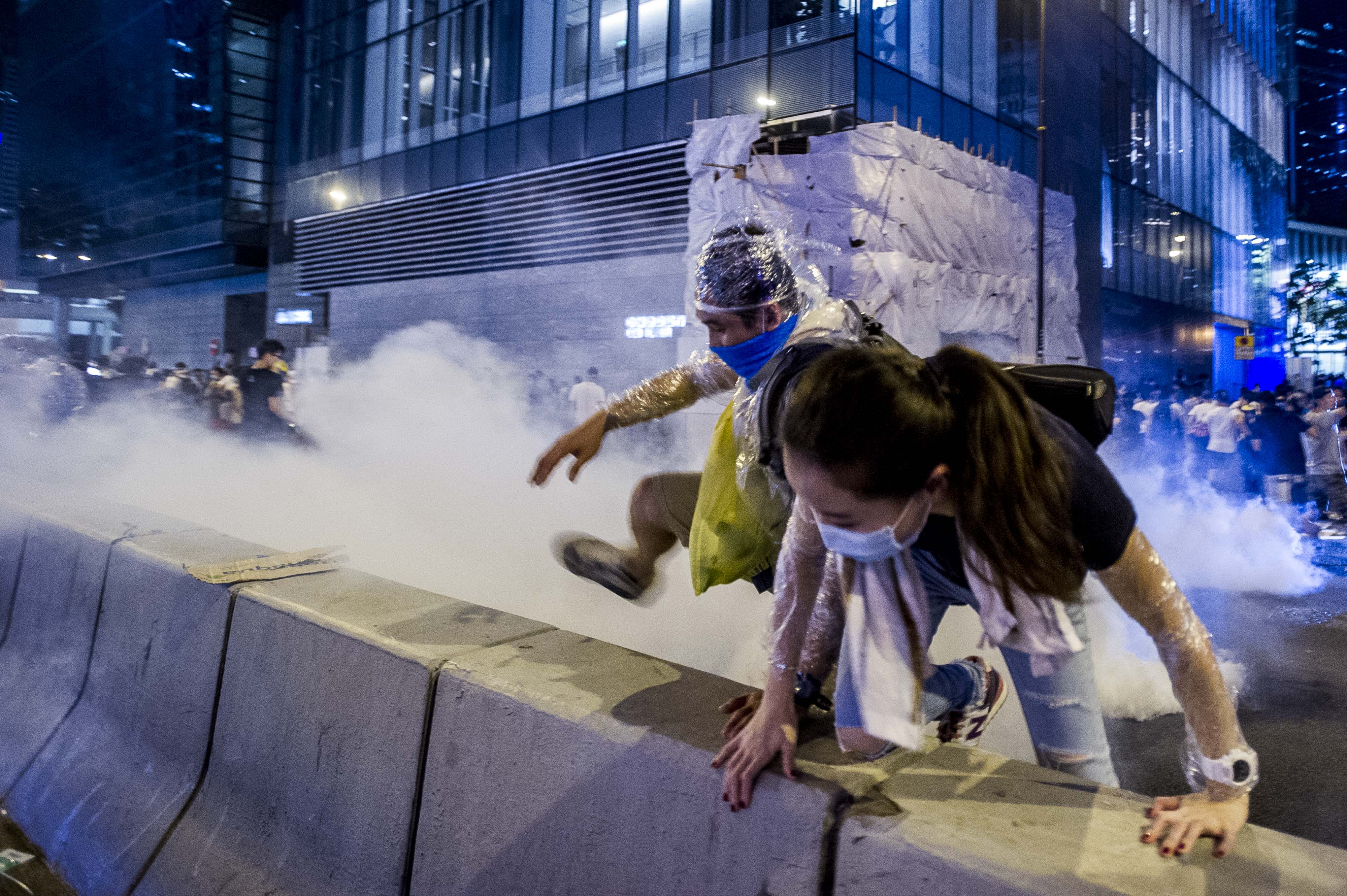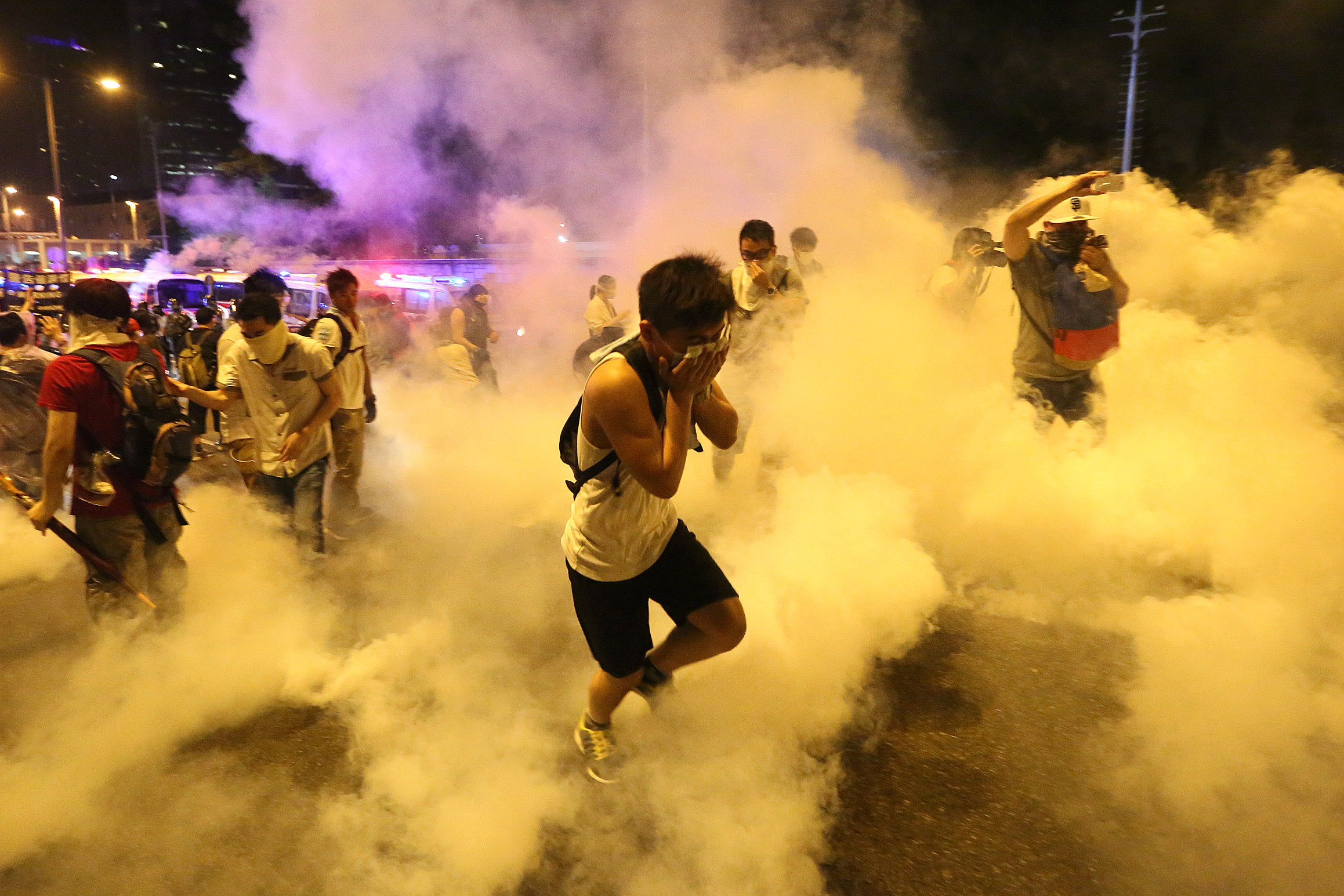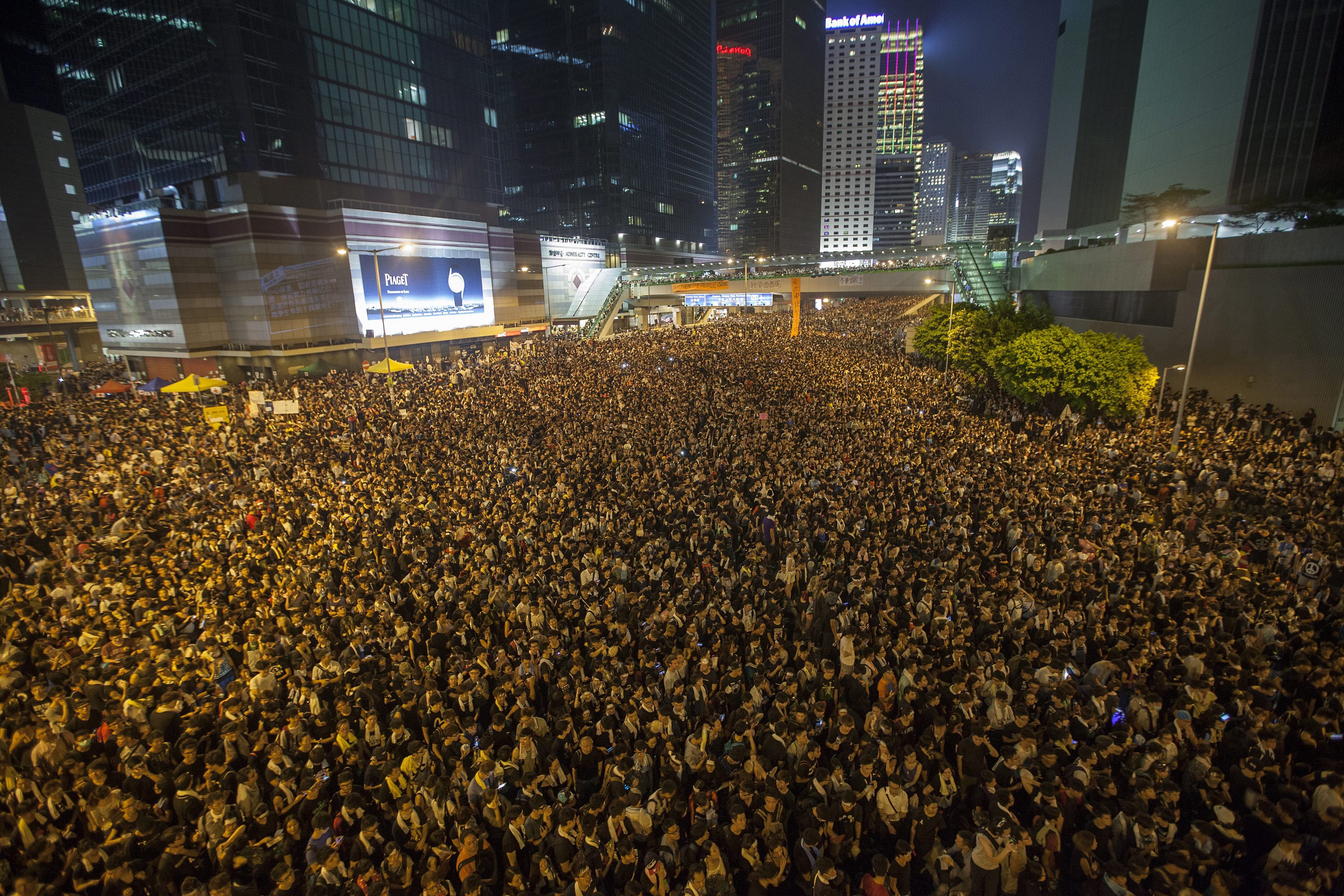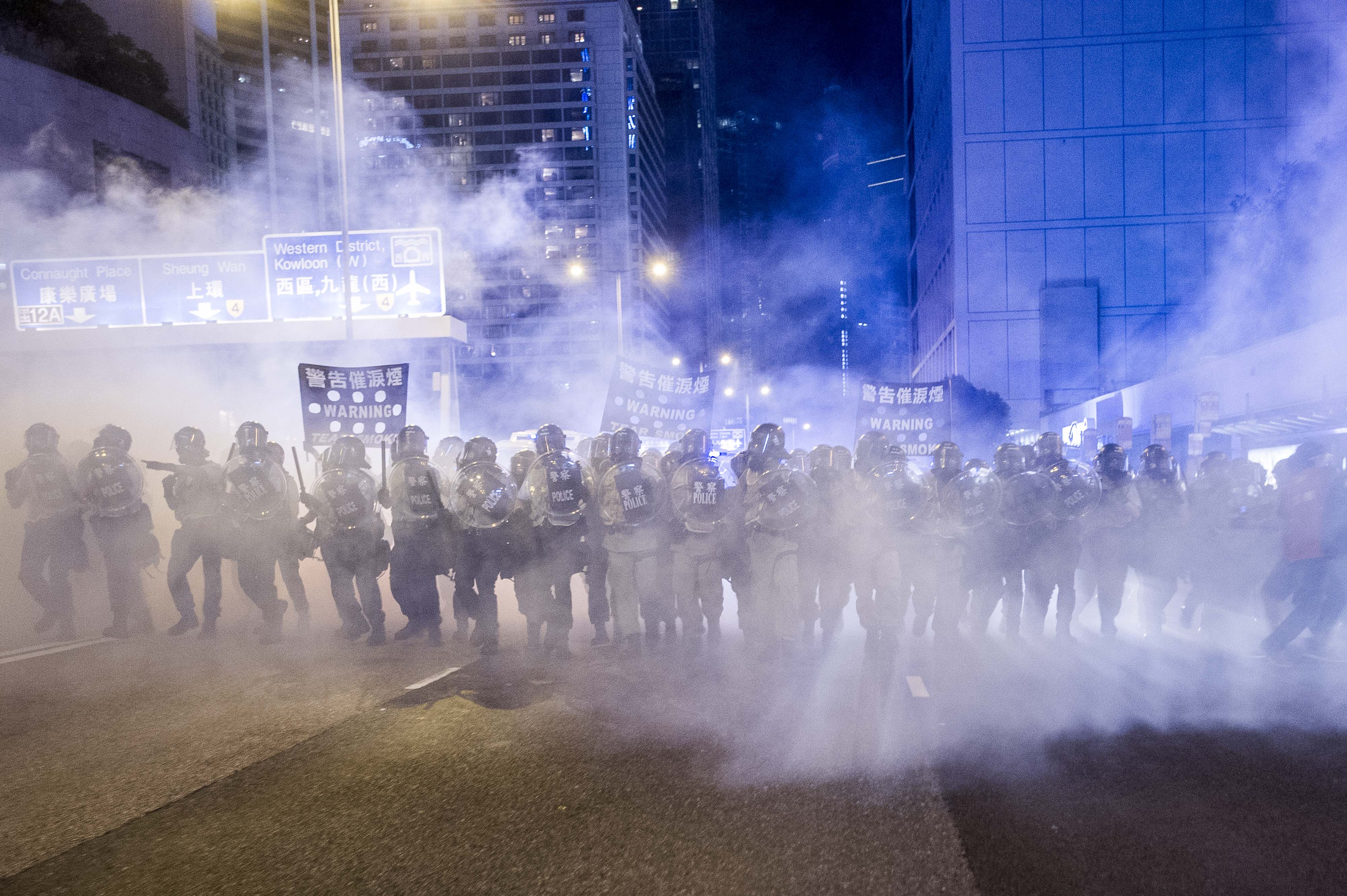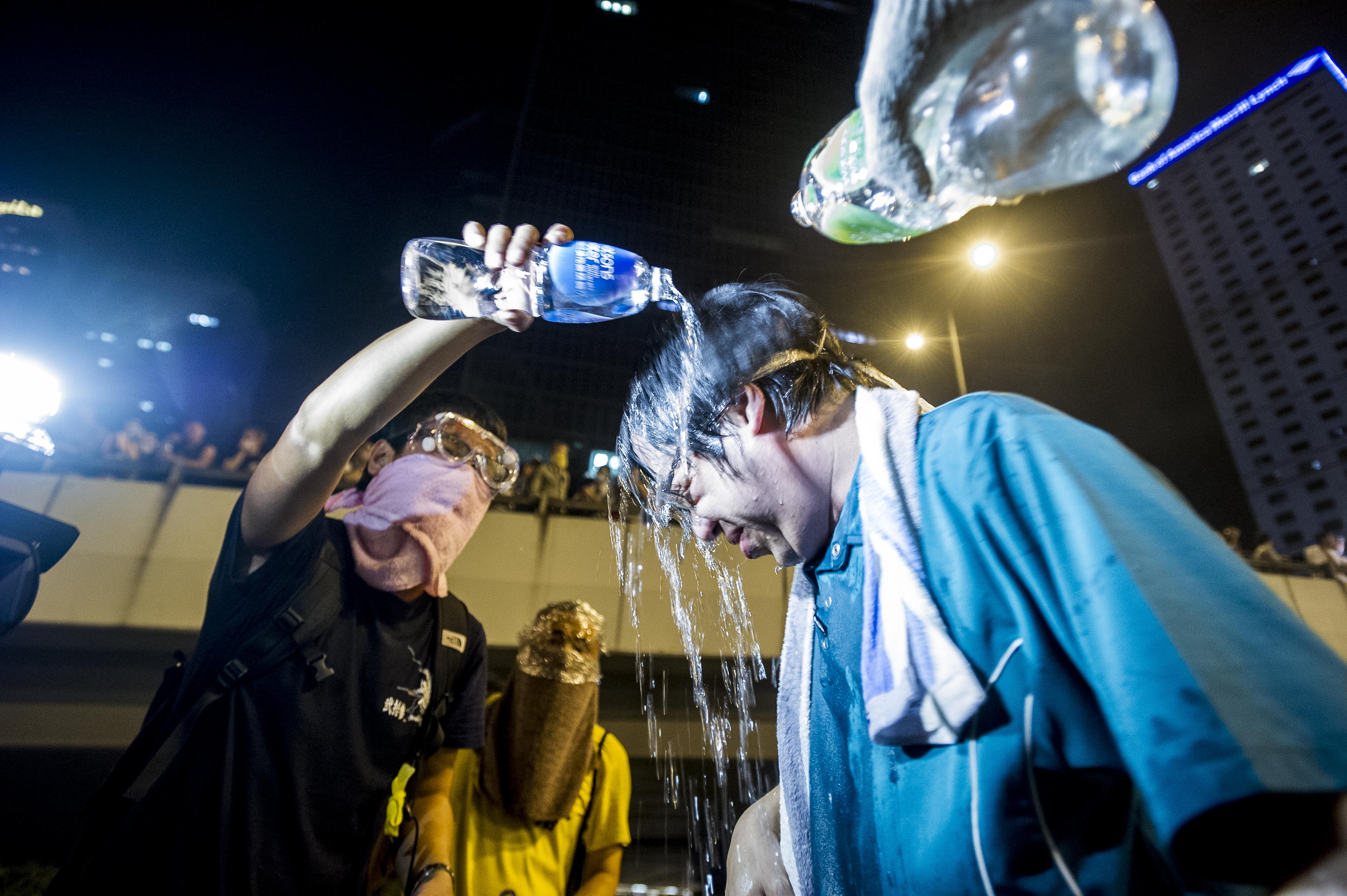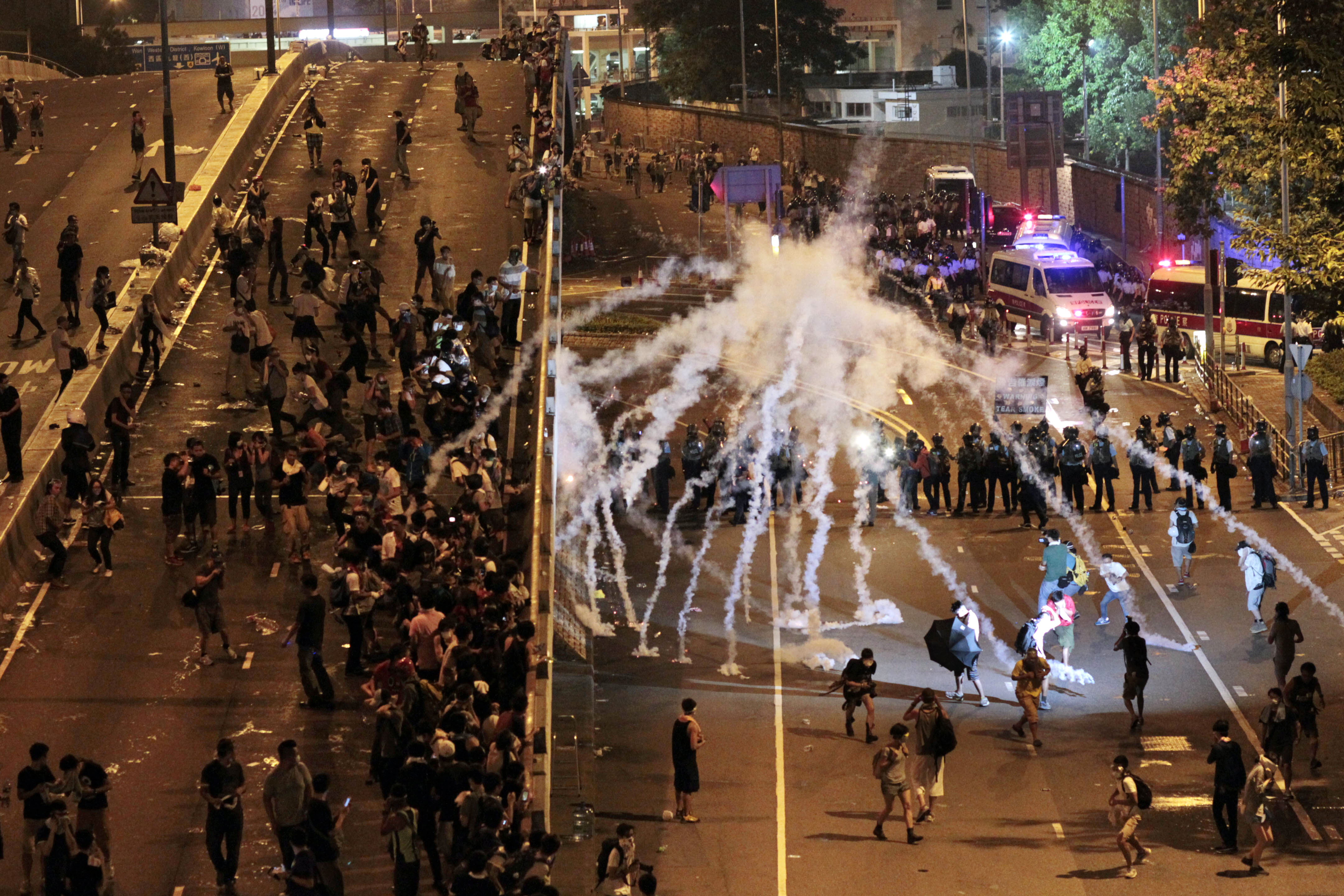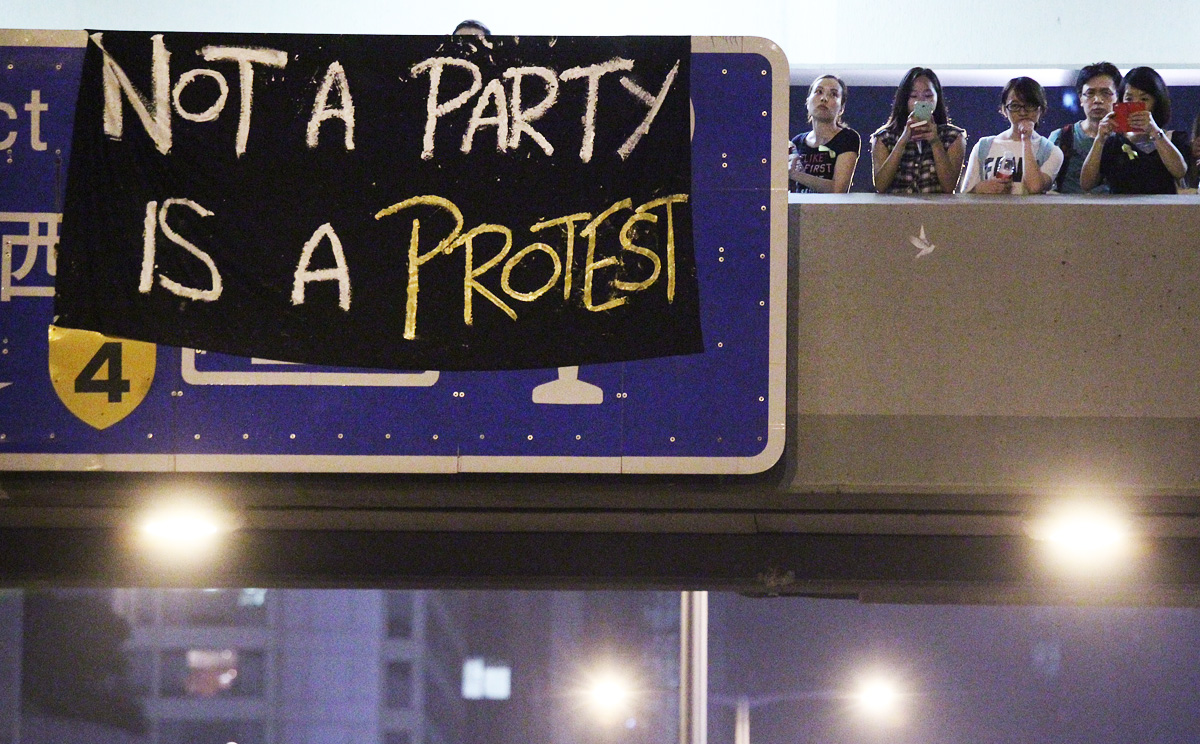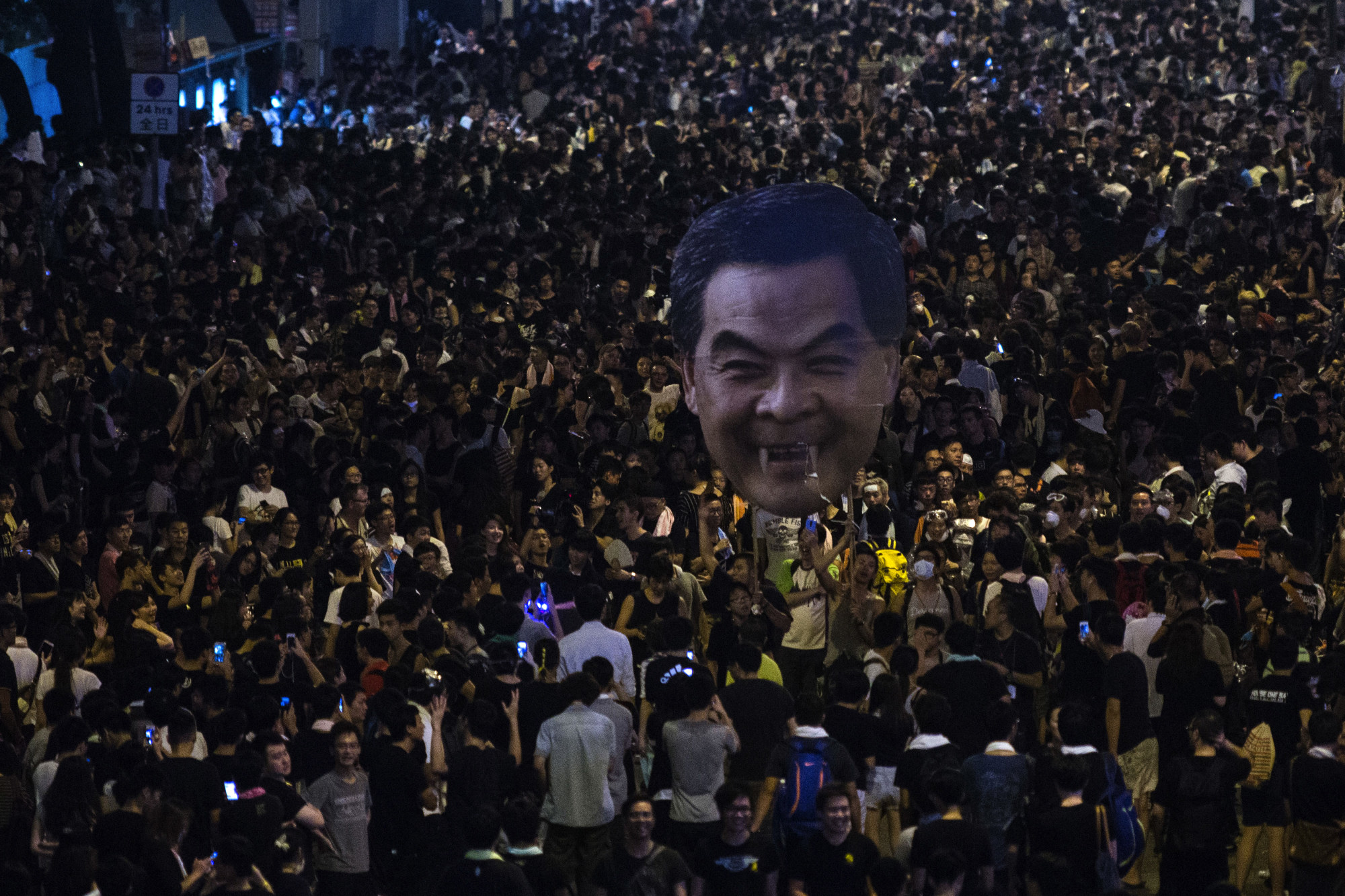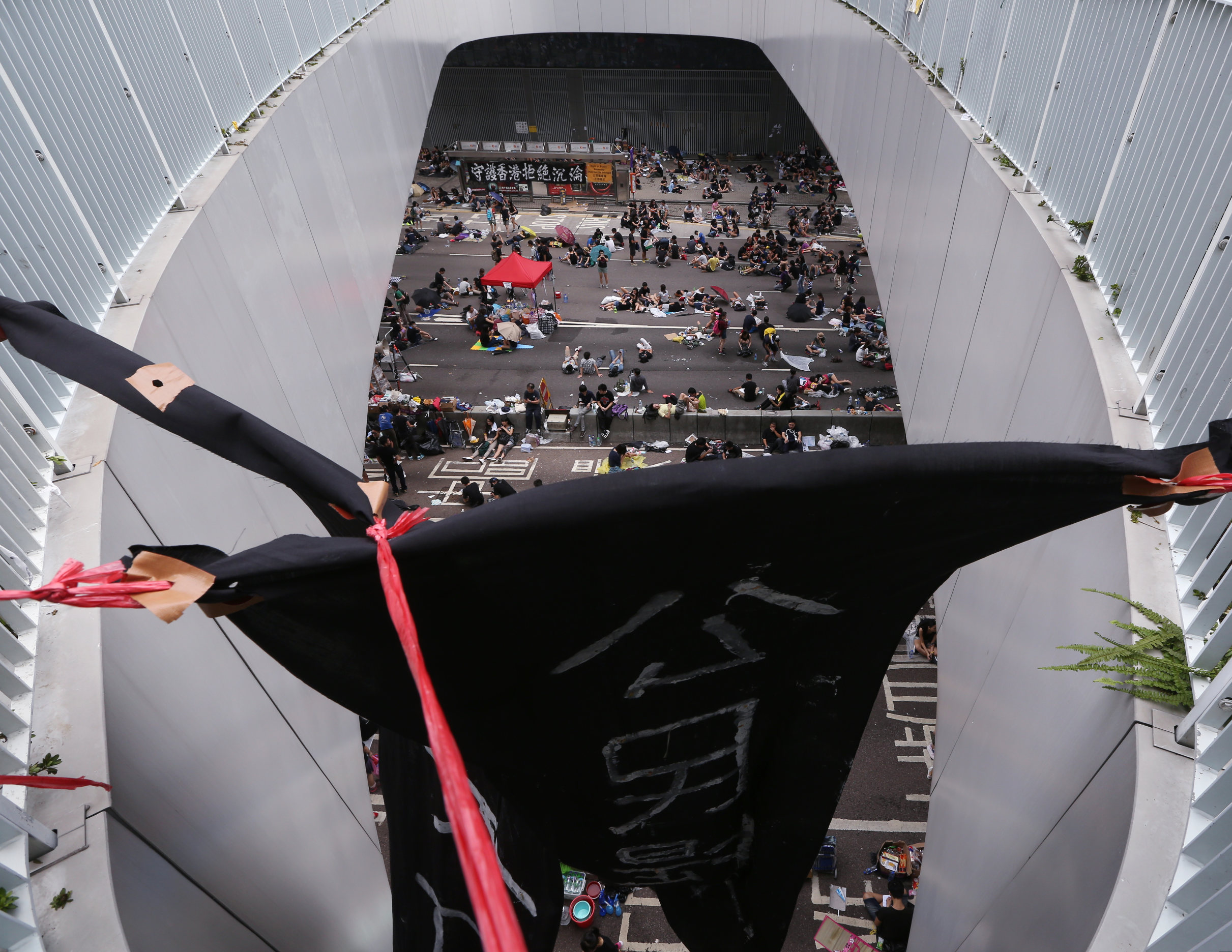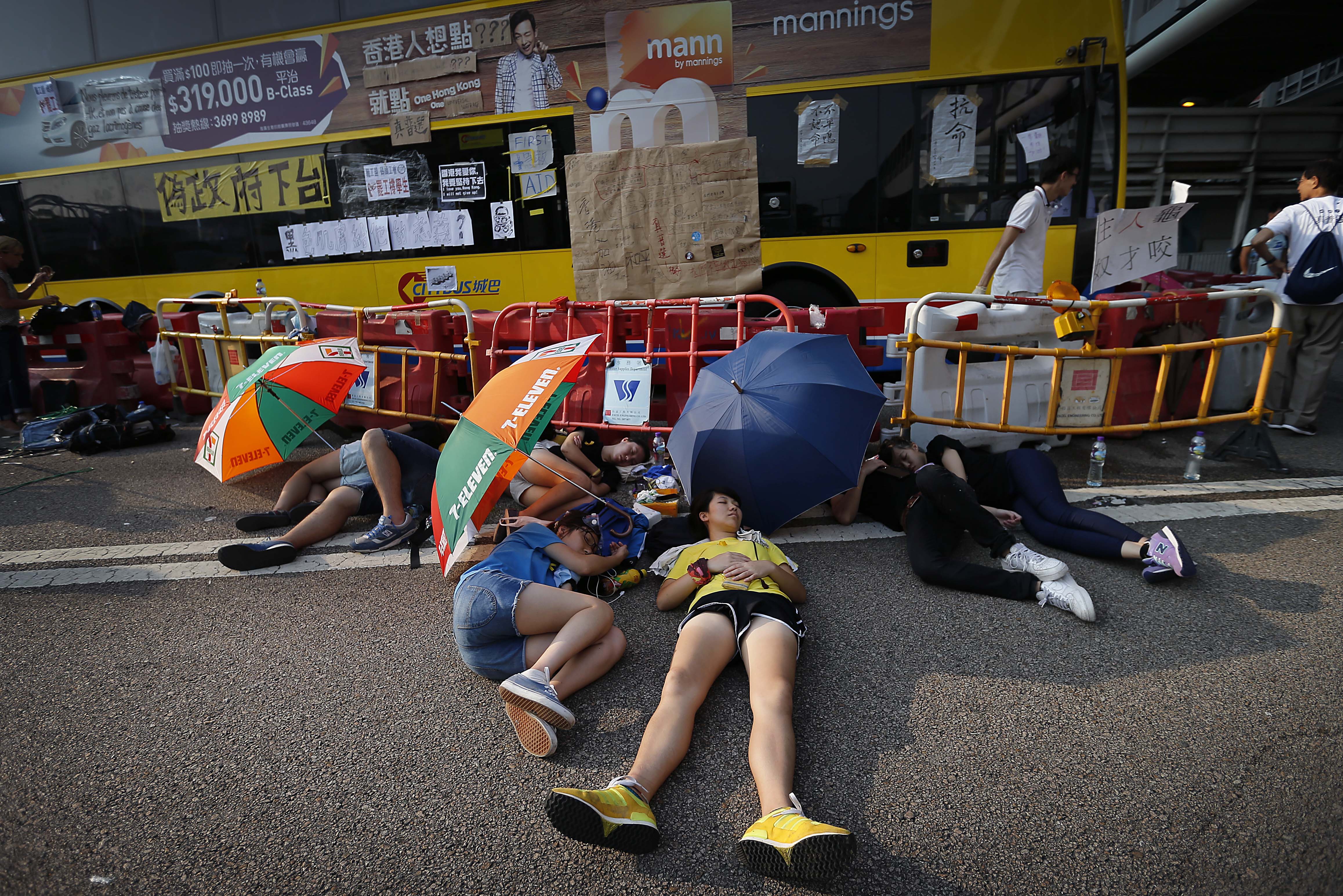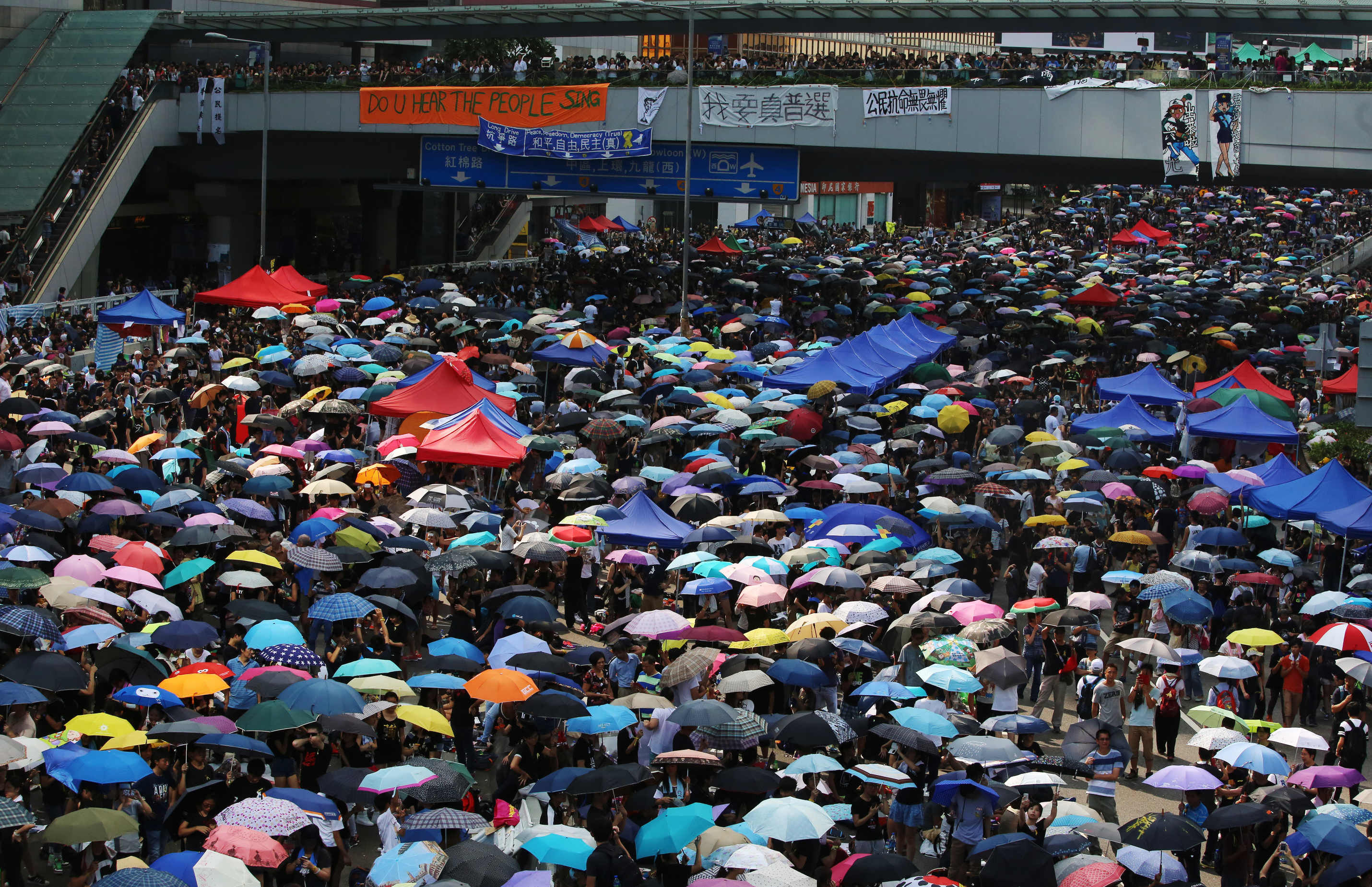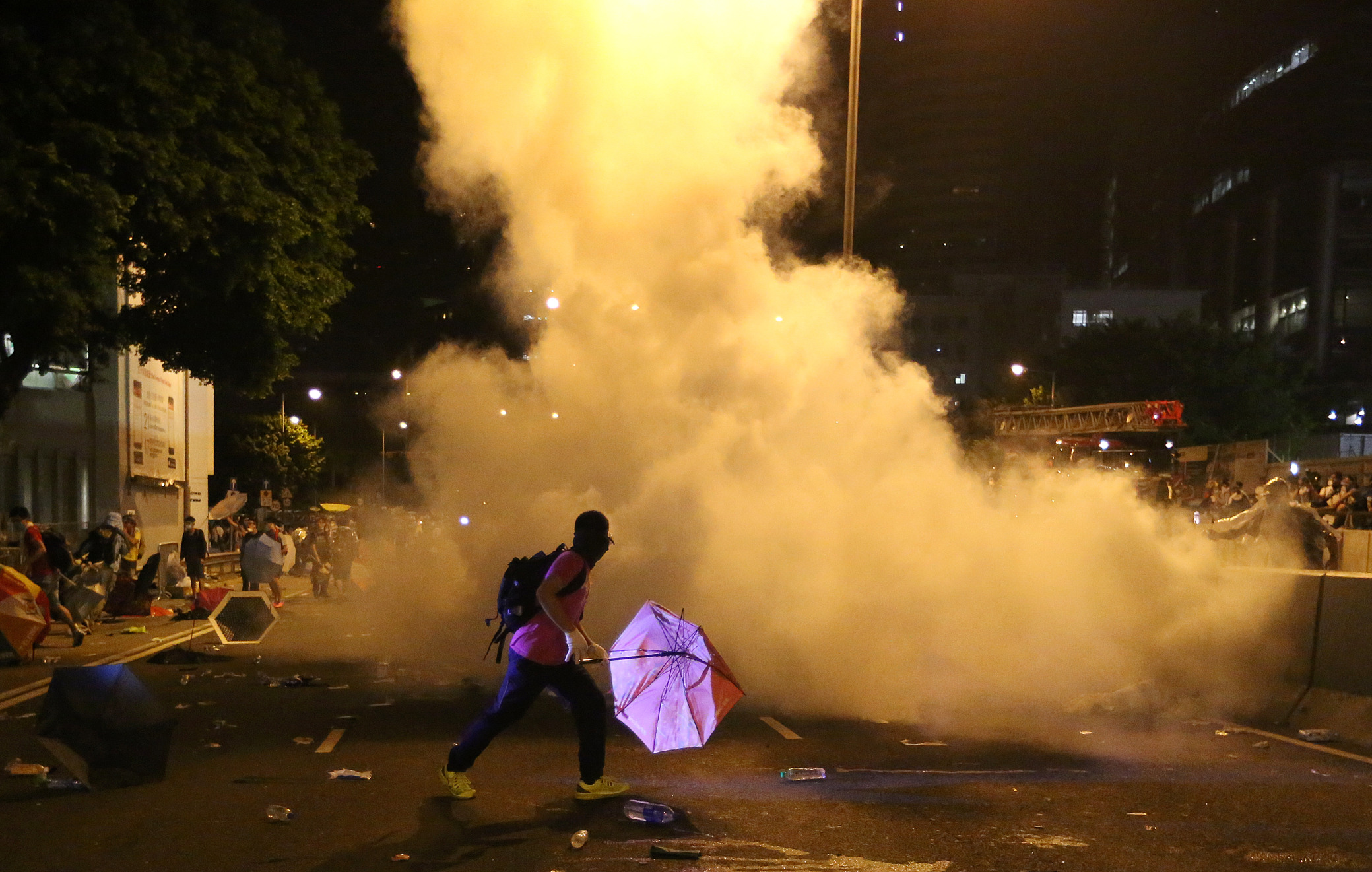-
IP addresses are NOT logged in this forum so there's no point asking. Please note that this forum is full of homophobes, racists, lunatics, schizophrenics & absolute nut jobs with a smattering of geniuses, Chinese chauvinists, Moderate Muslims and last but not least a couple of "know-it-alls" constantly sprouting their dubious wisdom. If you believe that content generated by unsavory characters might cause you offense PLEASE LEAVE NOW! Sammyboy Admin and Staff are not responsible for your hurt feelings should you choose to read any of the content here. The OTHER forum is HERE so please stop asking.
You are using an out of date browser. It may not display this or other websites correctly.
You should upgrade or use an alternative browser.
You should upgrade or use an alternative browser.
#OccupyCentral thread: Give me Liberty or Give me Death!
- Thread starter Asterix
- Start date
Re: What is Occupy Central? 10 key facts about Hong Kong’s pro-democracy movement
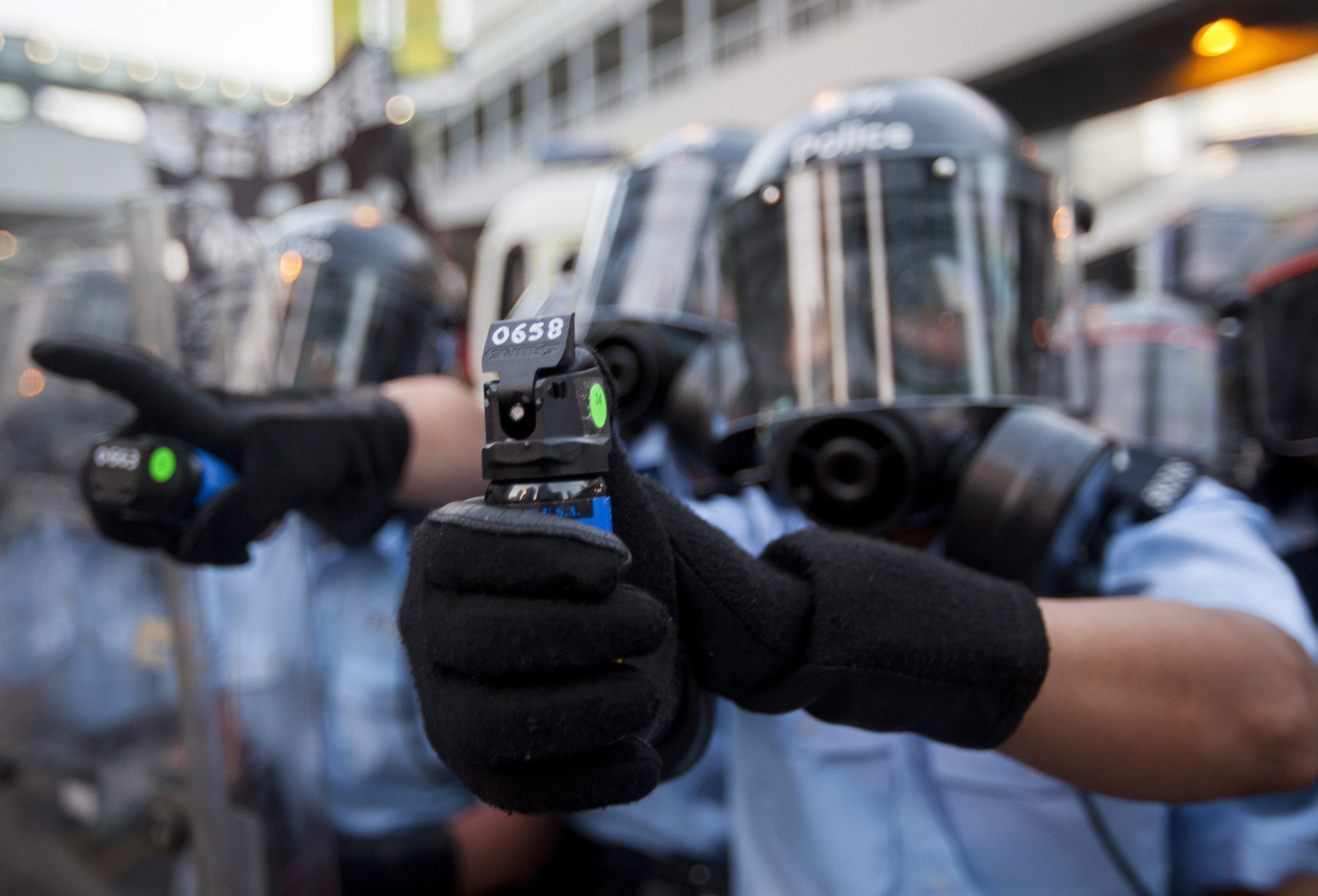
A police officer points pepper spray at protesters. Authorities have been criticised for their heavy-handed tactics in the first days of the demonstrations. Photo: EPA

A police officer points pepper spray at protesters. Authorities have been criticised for their heavy-handed tactics in the first days of the demonstrations. Photo: EPA
Re: What is Occupy Central? 10 key facts about Hong Kong’s pro-democracy movement
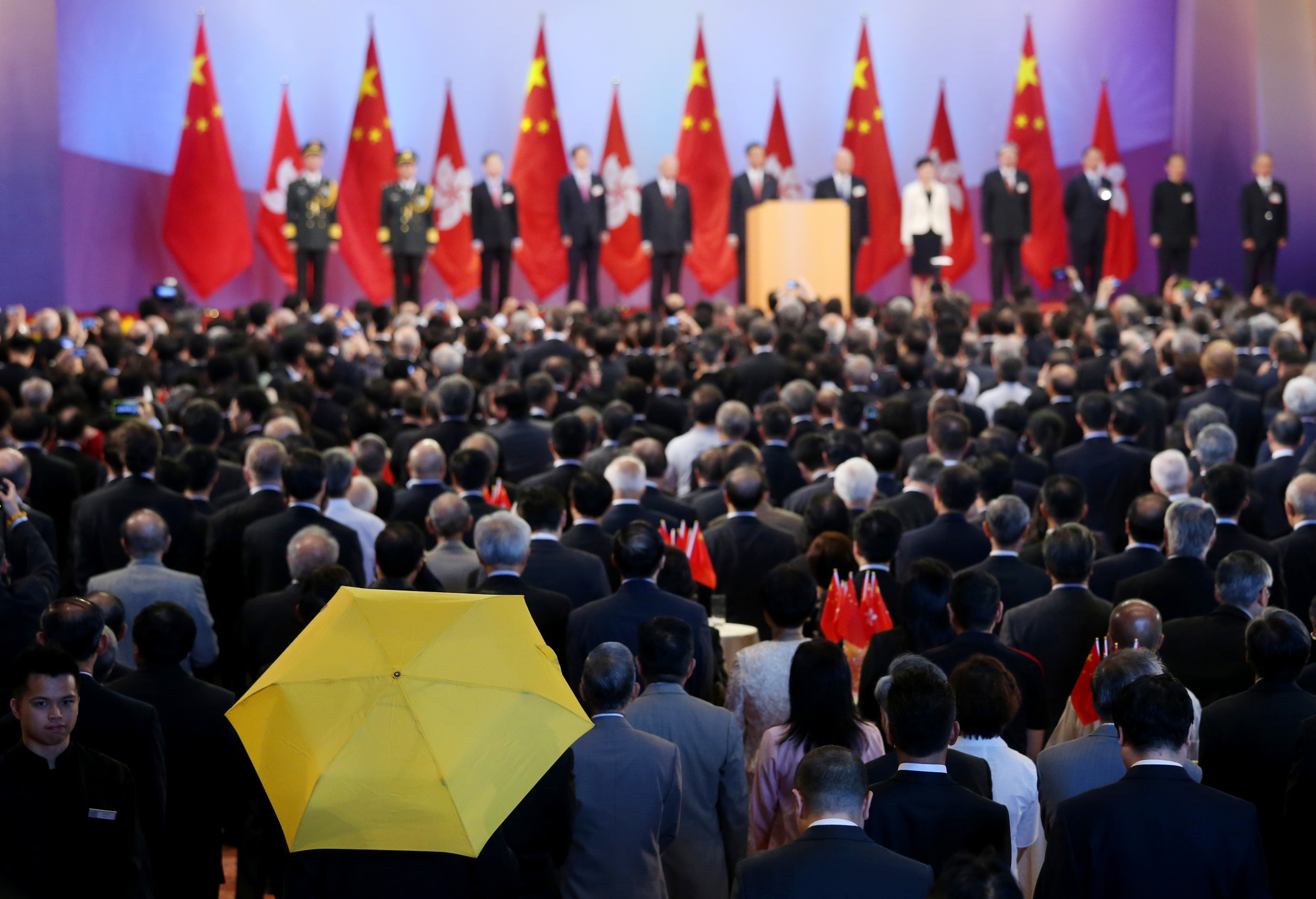
District Councillor Paul Zimmerman holding a yellow umbrella in silent protest during a National Day Reception attended by CY Leung. Photo: KY Cheung

District Councillor Paul Zimmerman holding a yellow umbrella in silent protest during a National Day Reception attended by CY Leung. Photo: KY Cheung
Re: What is Occupy Central? 10 key facts about Hong Kong’s pro-democracy movement
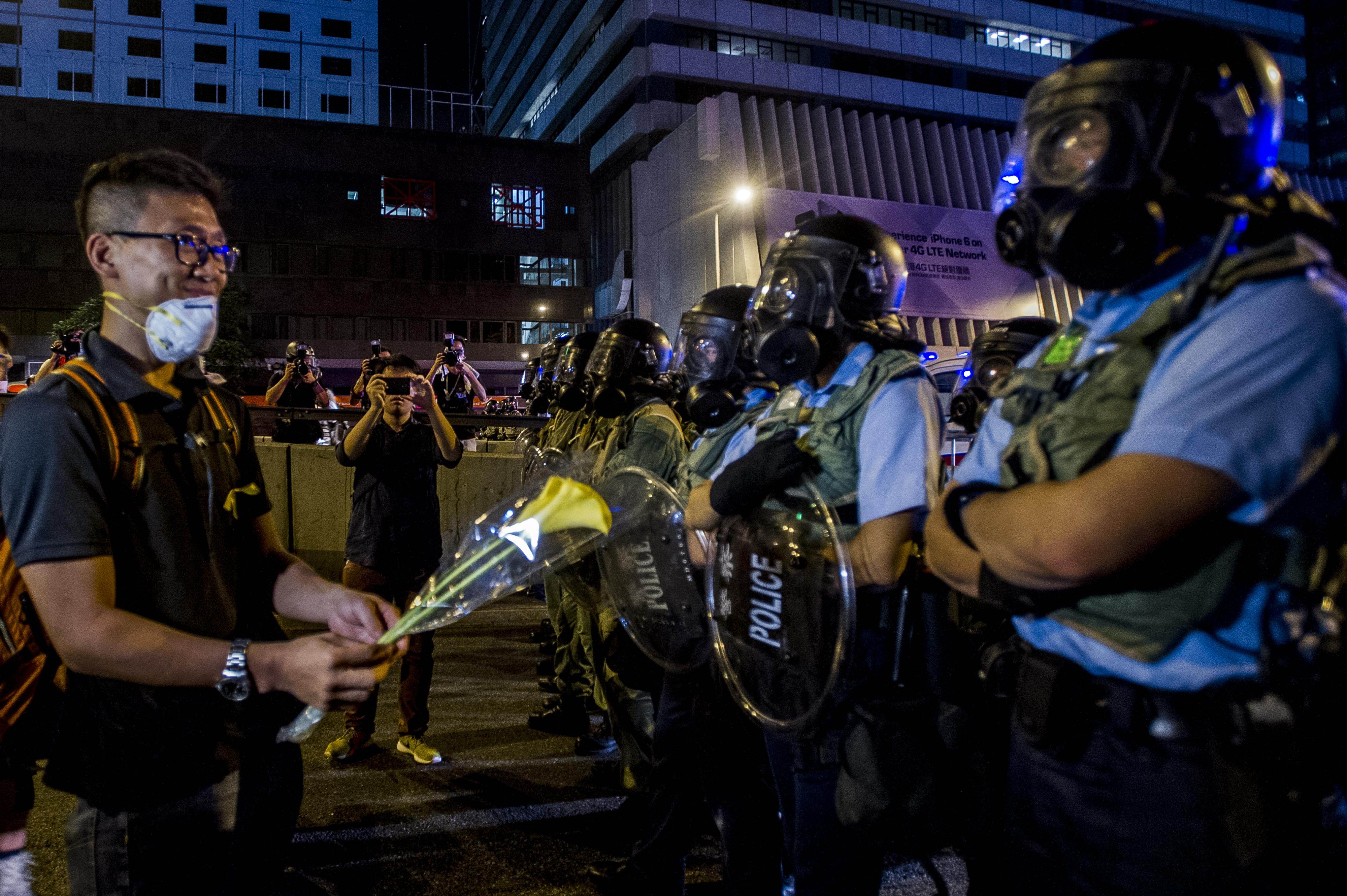
A demonstrator offers a flower to police in riot gear. Tear gas has not been used since Sunday night, and the protests have taken on a more convivial air. Photo: AFP

A demonstrator offers a flower to police in riot gear. Tear gas has not been used since Sunday night, and the protests have taken on a more convivial air. Photo: AFP
Re: What is Occupy Central? 10 key facts about Hong Kong’s pro-democracy movement
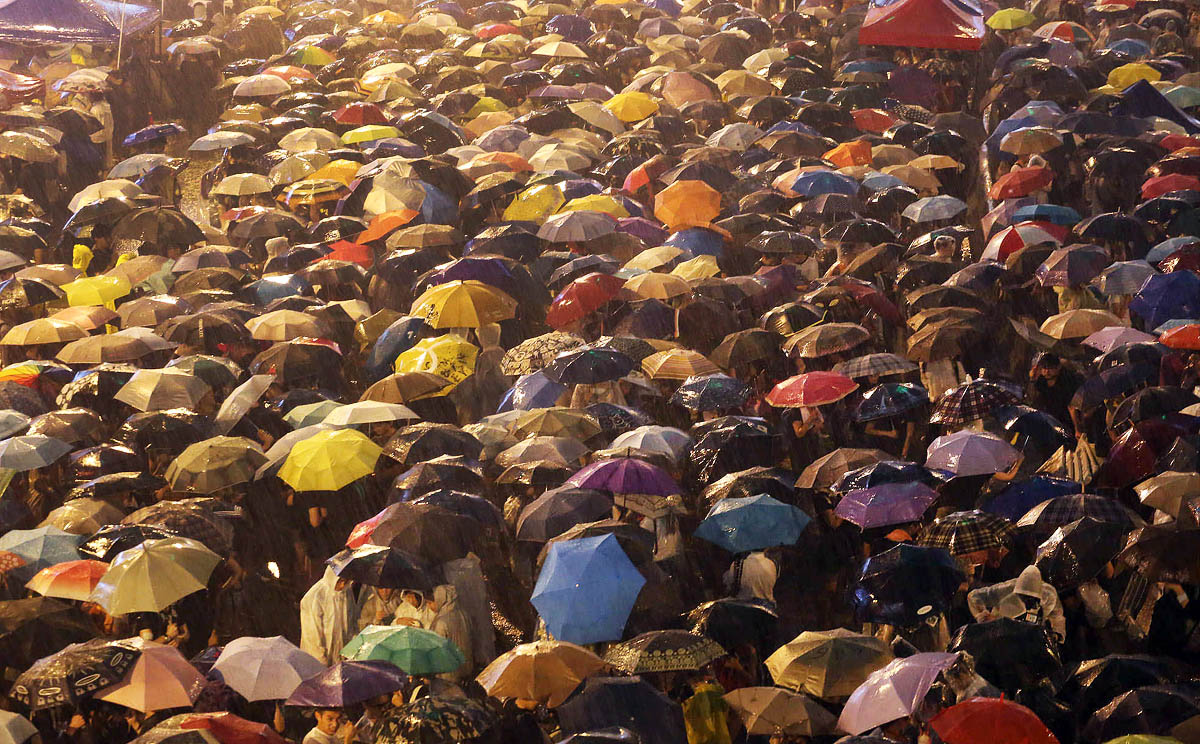
Demonstrators shelter from the rain. The protests have been called the "Umbrella Revolution" after demonstrators used them to protect themselves from police pepper spray. Photo: Felix Wong

Demonstrators shelter from the rain. The protests have been called the "Umbrella Revolution" after demonstrators used them to protect themselves from police pepper spray. Photo: Felix Wong
Re: What is Occupy Central? 10 key facts about Hong Kong’s pro-democracy movement
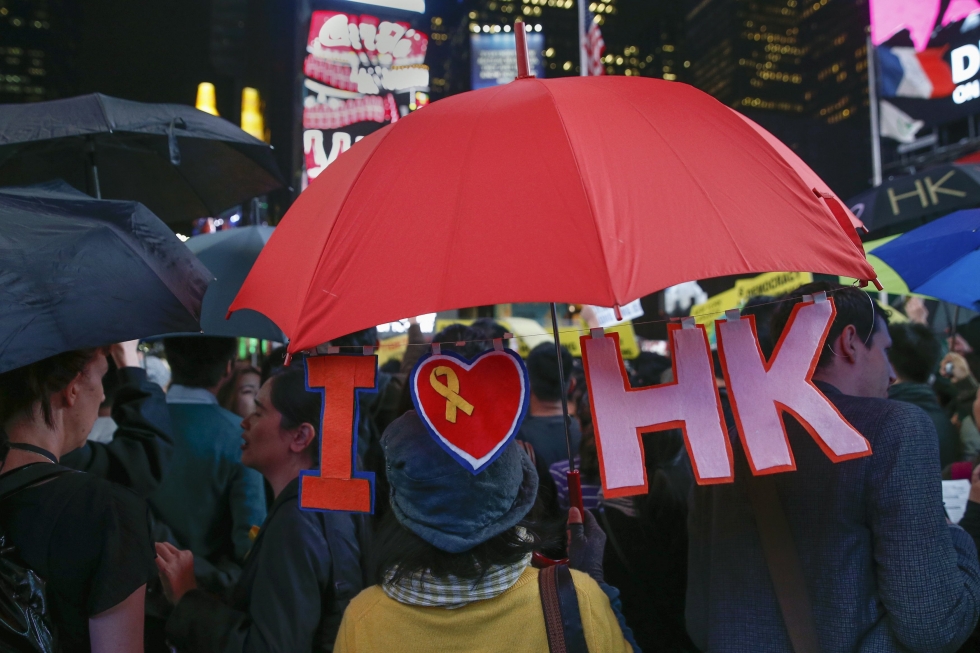
A demonstrator in New York's Time Square holds a sign reading "I <3 Hong Kong". Solidarity protests have been held in dozens of cities around the world. Photo: Reuters

A demonstrator in New York's Time Square holds a sign reading "I <3 Hong Kong". Solidarity protests have been held in dozens of cities around the world. Photo: Reuters
Re: What is Occupy Central? 10 key facts about Hong Kong’s pro-democracy movement
Beijing, Hong Kong governments play waiting game in hope Occupy will run out of steam
After tear gas failed to dislodge the protesters, officials hope fatigue and public criticism will wear them down and force end to occupation
PUBLISHED : Thursday, 02 October, 2014, 3:37am
UPDATED : Thursday, 02 October, 2014, 9:23am
Gary Cheung, Amy Nip and Vivienne Chow
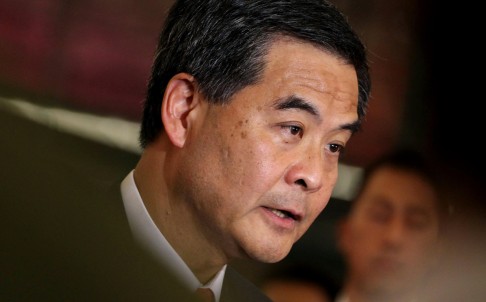
The Federation of Students had offered talks with Chief Secretary Carrie Lam Cheng Yuet-ngor - if Chief Executive Leung Chun-ying (above) resigned first.
Both the Beijing and Hong Kong governments are pinning their hopes on the pro-democracy protests running out of steam due to fatigue and complaints from people inconvenienced by the demonstrations.
Sources close to both governments gave an indication of their thinking as uniformed police remained absent from affected areas such as Mong Kok and Causeway Bay. Few police have been seen near the protests since Monday, despite concerns about public order and further polarisation in the community.
The softy-softly approach has been in place since riot police were withdrawn after the use of 87 rounds of tear gas overnight on Sunday failed to break up demonstrations in Admiralty - and indeed prompted new protest zones to emerge.
Tsim Sha Tsui was the latest area affected, with a few dozen protesters blocking a section of Canton Road early yesterday, an area full of luxury goods stores popular with mainland tourists arriving for National Day.
A mainland researcher familiar with the central government's thinking said the best scenario would be for protesters to gradually pull out, worn down by fatigue and complaints from people fed up with the protests.
"Hongkongers should seriously ponder the impact on people's livelihoods and business operations if the protests are prolonged," the researcher said.
The response of Beijing's top man in Hong Kong, liaison office chief Zhang Xiaoming, added credence to the idea of a "wait-and-see" approach. Asked about the impact of the protest at a National Day reception, he said only: "The sun rises as usual."
A Hong Kong government source admitted there was little else the administration could do.
"We can't afford to adopt a high-handed approach to protesters again after the public outcry sparked by the use of tear gas on Sunday," the source said.
Meanwhile the prospects for dialogue between the government and protesters remain slim.
The Federation of Students had offered talks with Chief Secretary Carrie Lam Cheng Yuet-ngor - if Chief Executive Leung Chun-ying resigned first. An authoritative government source yesterday rejected the idea, but said the administration retained an open mind on the possibility of talks at "appropriate venues".
Lester Shum, the federation's deputy secretary general, said talks with Lam or even Beijing officials were possible - if they faced protesters outside government headquarters.
"If Leung does not step down by today, we will escalate the protests by spreading the Occupy movement to premises of other government departments," Shum said.
But the authoritative government source rejected the idea of Leung going - even if he wanted to. "The chief executive will not resign, nor will the central government allow him to step down," the source said.
And, dismissing rumours of discord at the top, the source said the government was "highly united", adding: "It is out of the question that the chief secretary adopts a softer stance while the chief executive is tougher."
Meanwhile criticism of the protests from business leaders grew yesterday, as the week-long national holiday began.
Michael Li Hon-shing, executive director of the Federation of Hotel Owners, accused the students of "making Hong Kong collapse". He said bookings at some Wan Chai hotels had been cancelled, though the full impact had not yet been calculated.
"People started dumping eggs [on protesters] because they are growing impatient," he said, referring to incidents at the Causeway Bay protest zone.
Staff at the Fuk Fung Dispensary in the Mong Kok protest zone said business was slow.
"Of course [the protest] has affected business," one shop assistant said. "Rents are expensive here. We can't pay rent or salaries without business, right?"
Meanwhile Chinese University vice chancellor Professor Joseph Sung Jao-yiu spoke of his tears when he saw Sunday's crackdown on protesters.
"I call upon all to refrain from using force … I urge … dialogue between the government and our students," Sung wrote to students, staff and alumni.
Beijing, Hong Kong governments play waiting game in hope Occupy will run out of steam
After tear gas failed to dislodge the protesters, officials hope fatigue and public criticism will wear them down and force end to occupation
PUBLISHED : Thursday, 02 October, 2014, 3:37am
UPDATED : Thursday, 02 October, 2014, 9:23am
Gary Cheung, Amy Nip and Vivienne Chow

The Federation of Students had offered talks with Chief Secretary Carrie Lam Cheng Yuet-ngor - if Chief Executive Leung Chun-ying (above) resigned first.
Both the Beijing and Hong Kong governments are pinning their hopes on the pro-democracy protests running out of steam due to fatigue and complaints from people inconvenienced by the demonstrations.
Sources close to both governments gave an indication of their thinking as uniformed police remained absent from affected areas such as Mong Kok and Causeway Bay. Few police have been seen near the protests since Monday, despite concerns about public order and further polarisation in the community.
The softy-softly approach has been in place since riot police were withdrawn after the use of 87 rounds of tear gas overnight on Sunday failed to break up demonstrations in Admiralty - and indeed prompted new protest zones to emerge.
Tsim Sha Tsui was the latest area affected, with a few dozen protesters blocking a section of Canton Road early yesterday, an area full of luxury goods stores popular with mainland tourists arriving for National Day.
A mainland researcher familiar with the central government's thinking said the best scenario would be for protesters to gradually pull out, worn down by fatigue and complaints from people fed up with the protests.
"Hongkongers should seriously ponder the impact on people's livelihoods and business operations if the protests are prolonged," the researcher said.
The response of Beijing's top man in Hong Kong, liaison office chief Zhang Xiaoming, added credence to the idea of a "wait-and-see" approach. Asked about the impact of the protest at a National Day reception, he said only: "The sun rises as usual."
A Hong Kong government source admitted there was little else the administration could do.
"We can't afford to adopt a high-handed approach to protesters again after the public outcry sparked by the use of tear gas on Sunday," the source said.
Meanwhile the prospects for dialogue between the government and protesters remain slim.
The Federation of Students had offered talks with Chief Secretary Carrie Lam Cheng Yuet-ngor - if Chief Executive Leung Chun-ying resigned first. An authoritative government source yesterday rejected the idea, but said the administration retained an open mind on the possibility of talks at "appropriate venues".
Lester Shum, the federation's deputy secretary general, said talks with Lam or even Beijing officials were possible - if they faced protesters outside government headquarters.
"If Leung does not step down by today, we will escalate the protests by spreading the Occupy movement to premises of other government departments," Shum said.
But the authoritative government source rejected the idea of Leung going - even if he wanted to. "The chief executive will not resign, nor will the central government allow him to step down," the source said.
And, dismissing rumours of discord at the top, the source said the government was "highly united", adding: "It is out of the question that the chief secretary adopts a softer stance while the chief executive is tougher."
Meanwhile criticism of the protests from business leaders grew yesterday, as the week-long national holiday began.
Michael Li Hon-shing, executive director of the Federation of Hotel Owners, accused the students of "making Hong Kong collapse". He said bookings at some Wan Chai hotels had been cancelled, though the full impact had not yet been calculated.
"People started dumping eggs [on protesters] because they are growing impatient," he said, referring to incidents at the Causeway Bay protest zone.
Staff at the Fuk Fung Dispensary in the Mong Kok protest zone said business was slow.
"Of course [the protest] has affected business," one shop assistant said. "Rents are expensive here. We can't pay rent or salaries without business, right?"
Meanwhile Chinese University vice chancellor Professor Joseph Sung Jao-yiu spoke of his tears when he saw Sunday's crackdown on protesters.
"I call upon all to refrain from using force … I urge … dialogue between the government and our students," Sung wrote to students, staff and alumni.
Re: What is Occupy Central? 10 key facts about Hong Kong’s pro-democracy movement
Letter to Hong Kong students from 'Shenzhen student' draws mainland criticism
Many criticisms of the advice to go back to class come from students themselves; some speculate it was a propaganda ploy
PUBLISHED : Thursday, 02 October, 2014, 3:23pm
UPDATED : Thursday, 02 October, 2014, 6:57pm
Andrea Chen [email protected]
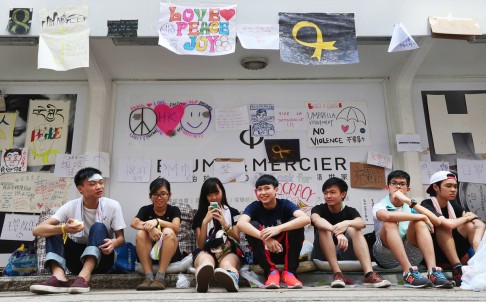
University students in Hong Kong kicked off a week-long class boycott on September 22 to protest against Beijing’s decision to set tight restrictions on the city’s chief executive election in 2017. Photo: K.Y. Cheng
An open letter allegedly written by a Shenzhen high school student calling on his (or her) Hong Kong counterparts to “return to classrooms” has come under fire on mainland social media.
Critics questioned whether the letter was a propaganda exercise orchestrated by the mainland authorities after it was reposted by the official Weibo account of the state-run Global Times, published by the Communist Party mouthpiece People’s Daily.
The signed letter – entitled “We share the same home – China” – was published by Shenzhen-based news website sznews.com on Wednesday with the byline “Si Yu, a senior student from Shenzhen No. 2 High School”.
Si wrote: “I am so confused when I learnt that some Hong Kong students my age boycotted class and went on [the] street that I can’t help but speak from my heart as your neighbour and your peer.”
He (or she, there is no way to know) added: “Whatever political system we are living in, the most important politics for us as students is to study hard.”
University students in Hong Kong kicked off a week-long class boycott on September 22 to protest against Beijing’s decision to set tight restrictions on the city’s chief executive election in 2017. The boycott escalated into pro-democracy protests in many of the city’s major commercial districts after police used pepper spray to remove students who stormed government headquarters to demand political reform on Friday night.
“As students we have very limited understanding about politics … It’s easy for us to be instigated by slogans when we are young,” the letter said. “Even if we had turned 18, it would leave a record when we are incited on to the street, which could affect us for life.
“I was young when Hong Kong was handed over back to China. But I can still recall the festive atmosphere.”
The student added: “I like Hong Kong so much that I feel sorry to see it turn into a chaotic city.”
The letter, posted by the Global Times on Wednesday, has been reposted more than 3,200 times, with most microbloggers questioning if the letter was propaganda from the mainland authorities.
“I wonder how old the student is and how poor his grades must have been. Seventeen years have passed since the handover but he is still in high school,” a microblogger from Guangzhou wrote.
“The writing is so poor, even for a fake open letter,” a teacher from Chongqing wrote.
“Besides the age of the ‘student’, I could not get the logic of his argument. He remembers Hong Kong being a beautiful city back in 1997, and doesn’t like it being chaotic today. Isn’t it why Hong Kong people have been protesting after the handover [against Beijing’s ruling that turns it into a chaotic place]?” said another microblogger from Singapore.
Calls to the high school went unanswered on the second day of the week-long National Day holiday.
Letter to Hong Kong students from 'Shenzhen student' draws mainland criticism
Many criticisms of the advice to go back to class come from students themselves; some speculate it was a propaganda ploy
PUBLISHED : Thursday, 02 October, 2014, 3:23pm
UPDATED : Thursday, 02 October, 2014, 6:57pm
Andrea Chen [email protected]

University students in Hong Kong kicked off a week-long class boycott on September 22 to protest against Beijing’s decision to set tight restrictions on the city’s chief executive election in 2017. Photo: K.Y. Cheng
An open letter allegedly written by a Shenzhen high school student calling on his (or her) Hong Kong counterparts to “return to classrooms” has come under fire on mainland social media.
Critics questioned whether the letter was a propaganda exercise orchestrated by the mainland authorities after it was reposted by the official Weibo account of the state-run Global Times, published by the Communist Party mouthpiece People’s Daily.
The signed letter – entitled “We share the same home – China” – was published by Shenzhen-based news website sznews.com on Wednesday with the byline “Si Yu, a senior student from Shenzhen No. 2 High School”.
Si wrote: “I am so confused when I learnt that some Hong Kong students my age boycotted class and went on [the] street that I can’t help but speak from my heart as your neighbour and your peer.”
He (or she, there is no way to know) added: “Whatever political system we are living in, the most important politics for us as students is to study hard.”
University students in Hong Kong kicked off a week-long class boycott on September 22 to protest against Beijing’s decision to set tight restrictions on the city’s chief executive election in 2017. The boycott escalated into pro-democracy protests in many of the city’s major commercial districts after police used pepper spray to remove students who stormed government headquarters to demand political reform on Friday night.
“As students we have very limited understanding about politics … It’s easy for us to be instigated by slogans when we are young,” the letter said. “Even if we had turned 18, it would leave a record when we are incited on to the street, which could affect us for life.
“I was young when Hong Kong was handed over back to China. But I can still recall the festive atmosphere.”
The student added: “I like Hong Kong so much that I feel sorry to see it turn into a chaotic city.”
The letter, posted by the Global Times on Wednesday, has been reposted more than 3,200 times, with most microbloggers questioning if the letter was propaganda from the mainland authorities.
“I wonder how old the student is and how poor his grades must have been. Seventeen years have passed since the handover but he is still in high school,” a microblogger from Guangzhou wrote.
“The writing is so poor, even for a fake open letter,” a teacher from Chongqing wrote.
“Besides the age of the ‘student’, I could not get the logic of his argument. He remembers Hong Kong being a beautiful city back in 1997, and doesn’t like it being chaotic today. Isn’t it why Hong Kong people have been protesting after the handover [against Beijing’s ruling that turns it into a chaotic place]?” said another microblogger from Singapore.
Calls to the high school went unanswered on the second day of the week-long National Day holiday.
Re: What is Occupy Central? 10 key facts about Hong Kong’s pro-democracy movement
Shenzhen man detained after posting Occupy Central pictures
PUBLISHED : Wednesday, 01 October, 2014, 2:38pm
UPDATED : Wednesday, 01 October, 2014, 2:40pm
Staff Repoters
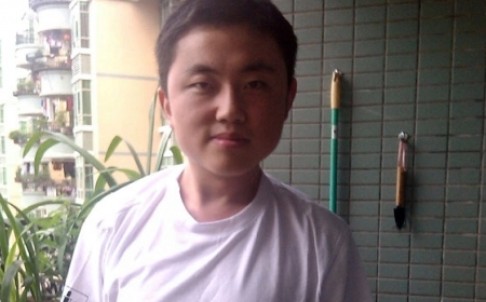
Wang Long. Photo: Weibo
A Shenzhen activist has been detained after posting pictures of Hong Kong’s Occupy Central protests on mainland social media, his former lawyer said.
Wang Long has been held in custody in Longgang district for “picking quarrels and provoking trouble”, his former lawyer Fan Biaowen told the South China Morning Post.
Wang, 26, hit the headlines earlier this year after suing his internet service provider China Unicom for blocking access to Google.
Fan said the police told him on Monday night that Wang had been held. Wang’s last Weibo message was posted in the early hours on Monday.
“They [police] told me it [detention] was due to his posting about the demonstration in Hong Kong and his previous engagement in activism,” said Fan.
Wang reposted at least six photos from Twitter and Facebook on Weibo showing thousands of Occupy Central supporters and students protesting against Beijing’s decision to set strict limits on the 2017 Hong Kong elections on Sunday, according to freeweibo.com, a website that documents deleted Weibo posts.
Fan’s law firm had come under pressure from the authorities not to represent Wang in this case. But Fan added that at least two other lawyers have offered to help.
Last month, Wang was forced to attend a “tea session” – code for being questioned by the national security staff – ahead of veteran legal activist Yang Maodong’s trial for “gathering a crowd to disrupt social order”, he told weiquanwang.org, a website that integrated advocates of the mainland activists. Yang is better known by his pen name Guo Feixiong.
Mainland internet users cannot access photo sharing platform Instagram and foreign news websites including Reuters amid the Hong Kong protests. Photos and messages about the demonstrations have been censored on Weibo and WeChat.
Longgang police could not be reached for comment on Wednesday. It is not clear when Wang will be released.
Shenzhen man detained after posting Occupy Central pictures
PUBLISHED : Wednesday, 01 October, 2014, 2:38pm
UPDATED : Wednesday, 01 October, 2014, 2:40pm
Staff Repoters

Wang Long. Photo: Weibo
A Shenzhen activist has been detained after posting pictures of Hong Kong’s Occupy Central protests on mainland social media, his former lawyer said.
Wang Long has been held in custody in Longgang district for “picking quarrels and provoking trouble”, his former lawyer Fan Biaowen told the South China Morning Post.
Wang, 26, hit the headlines earlier this year after suing his internet service provider China Unicom for blocking access to Google.
Fan said the police told him on Monday night that Wang had been held. Wang’s last Weibo message was posted in the early hours on Monday.
“They [police] told me it [detention] was due to his posting about the demonstration in Hong Kong and his previous engagement in activism,” said Fan.
Wang reposted at least six photos from Twitter and Facebook on Weibo showing thousands of Occupy Central supporters and students protesting against Beijing’s decision to set strict limits on the 2017 Hong Kong elections on Sunday, according to freeweibo.com, a website that documents deleted Weibo posts.
Fan’s law firm had come under pressure from the authorities not to represent Wang in this case. But Fan added that at least two other lawyers have offered to help.
Last month, Wang was forced to attend a “tea session” – code for being questioned by the national security staff – ahead of veteran legal activist Yang Maodong’s trial for “gathering a crowd to disrupt social order”, he told weiquanwang.org, a website that integrated advocates of the mainland activists. Yang is better known by his pen name Guo Feixiong.
Mainland internet users cannot access photo sharing platform Instagram and foreign news websites including Reuters amid the Hong Kong protests. Photos and messages about the demonstrations have been censored on Weibo and WeChat.
Longgang police could not be reached for comment on Wednesday. It is not clear when Wang will be released.
Similar threads
- Replies
- 17
- Views
- 735
- Replies
- 1
- Views
- 109
- Replies
- 14
- Views
- 987
- Replies
- 46
- Views
- 3K

